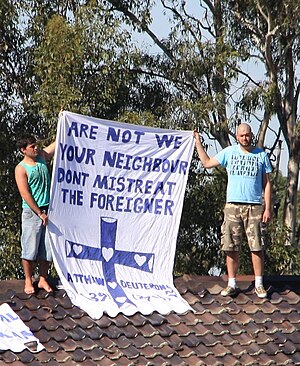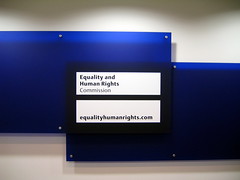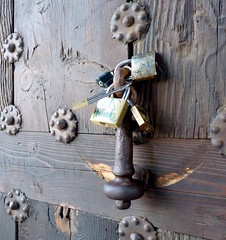By Paul Canning
A new report has detailed the shocking conditions in which immigrants and asylum seekers - men, women and children - are being detained in the Midwest of the United States. It offers a snapshot of six facilities but the conditions they found are replicated across the country.
"Over 320,000 immigrants locked up each year not only face tremendous
obstacles to challenging wrongful detention or winning their immigration
cases, but the conditions in which these civil detainees are held often
are as bad as or worse than those faced by imprisoned criminals," says the report.
The report found:
- Detainees going hungry through lack of food
- No heating through harsh Mid-Western winters
- Complaints ignored and those complaining placed in segregation
- Intimidation by staff
- Inadequate and dirty uniform clothing provided
- Inadequate or absent health care, placing lives at risk
- Poor or absent hygiene
Not Too Late for Reform, authored by Heartland Alliance’s
National Immigrant Justice Center (NIJC) and the
Midwest Coalition for Human Rights (MCHR), focuses on three county jails — Jefferson County Jail and Tri-County
Detention Center in Illinois and Boone County Jail in Kentucky.
In Jefferson, conditions are punitive and inhumane and breach
national standards on how immigration detainees are supposed to be treated. Detainees spend the day hungry because they lack food and report getting a hot meal only once every two weeks. Even in the summer, individuals huddle under blankets because of cold temperatures and inadequate clothing. Detainees with medical and mental health issues are told that they need to pay to see a doctor, which indigent individuals cannot afford.
Tara Tidwell-Cullen, director of communications at Heartland Alliance's National Immigrant Justice Center,
told International Business Times:
"The
important thing to note straight off with the detention standards is
they're not law so not enforceable. If the detention facilities ignore
them there's not really a legal process by which they can be challenged
so it doesn't really provide a whole lot of oversight so we see them
consistently violated with few to little consequences."
Often, detainees at Jefferson are required to buy basic hygiene items. They receive jail uniforms and undergarments that are torn, stained, and threadbare. Because laundry service is inconsistent, detainees are forced to wear soiled clothes week after week. Staff is rude and condescending, and detainees are too intimidated to report grievances. In the rare instances when grievances are filed, complaints are ignored or dismissed without merit.
At Boone detainees fear for their safety because they are often intermingled with criminal detainees. Like Jefferson, the jail is kept cold year-round and officials are discriminatory and nonresponsive to requests for
assistance.
A NIJC client said:
“Within one day of my arrival at Boone, I told the nurse that I am HIV-positive. She said that she would call the clinic to obtain my medical history. I also complained of depression and high blood pressure and informed a second nurse that I am HIV-positive. This nurse also promised to make a doctor’s appointment, but now almost six weeks have passed and I have never received any medication. Nothing has changed since I was moved to Tri-County. I told the nurse right away about my HIV status but still no exam and every day goes by without my pills.”
All of the facilities are remote and their location reinforces the lack of access to justice for those detained in a situation where legal support is not provided and detainees often rely on pro-bono lawyers who are thin on the ground. Isolation from attorneys, social service providers, and immigrant communities means that at-risk people are often deported before they are able to contact their families or seek legal counsel. Compounding this, detainees at one facility, Tri-County Detention Center, report being blocked from access to a law library
NIJC says that many of those they deal with are able to remain legally in the US and should not have been detained.
Around half of those detained have committed no offense and according to government policy are supposed to be a low priority.
In a typical example, 'Alexander' (NIJC client whose name has been changed) was stopped by police for driving over the 30 miles-per-hour speed limit. His family was also in the car and became distressed, particularly his eldest son who suffers from a medical condition. Alexander was taken into Immigration and Customs Enforcement (ICE) custody and his family was left alone on the sidewalk with no way home.
Two years ago, the Department of Homeland Security (DHS) and ICE committed to shift the
immigration detention system away from its longtime reliance on jails
and jail-like facilities, to facilities with conditions more appropriate
for civil immigration law detainees.
A 2009 report by National Immigration Law Center warned that the swiftly expanding system was "woefully unregulated."
The government’s commitment
followed years of findings from bipartisan groups including the Commission on International Religious Freedom, the
Council on Foreign Relations
task force on immigration policy, and the Constitution Project’s
Liberty and Security Committee – as well as the DHS Special Advisor
charged by DHS Secretary
Janet Napolitano
with reviewing the immigration detention system – that jails and
jail-like facilities are inappropriate and unnecessarily costly to hold
asylum seekers and other civil immigration detainees. Nationally, around half of detainees are held in such facilities.
The new report criticized the planned construction under an ICE contract of a detention facility
in Crete, Illinois by
Corrections Corporation of America (CCA), a
private company that has a record of "egregious human rights
violations," including the death of an immigrant detainee and incidents
of sexual abuse, even as its profits have grown in past years. Rather
than rely on more costly jails or private contractors, the report's
authors urged the use of alternative to detention programs for
immigrants who do not pose a flight risk.
American taxpayers will spend more than $2 billion to maintain this system in FY 2012 – more than 28 times ICE’s budget for more cost-effective Alternatives to Detention, which save more than $110 per detainee per day.
CCA aggressively lobbies Congress and DHS in favor of immigration detention. Between 1999-2009, the major private prison contractors, including CCA,
spent more than $20 million on lobbying.
"Instead of pursuing contractual relationships with repeat-offender correctional partners," says the report, "DHS should initiate a movement toward the “case management” model. this model, case workers who have the expertise to address the needs of a civil detention population and have the capacity to foster a non-correctional culture would refer individuals who pose no threat to the community into alternative to detention (ATD) programs, at significant cost-savings to the federal government."
“The administration has plans to create more appropriate conditions for about 14 percent of their immigration detention beds, but the transformation away from the jail model still has a long way to go,” said Human Rights First’s Ruthie Epstein in October.
NIJC-MCHR Not Too Late for Reform Report



































 Join our page
Join our page

